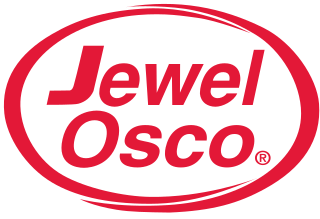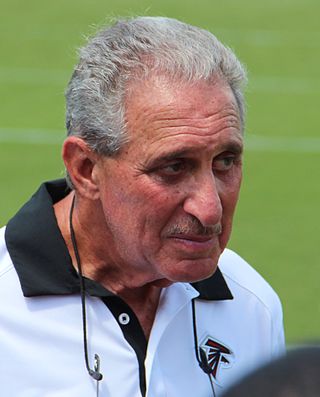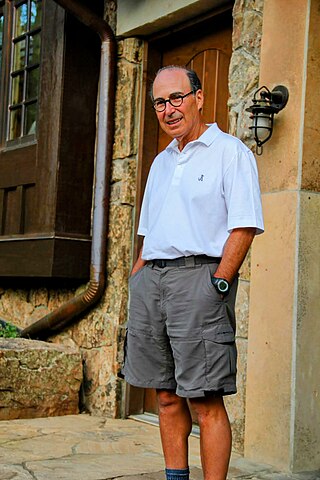Related Research Articles

Jewel-Osco is a regional supermarket chain in the Chicago metropolitan area, headquartered in Itasca, a western suburb. In 2007, the company had 188 stores across northern, central, and western Illinois; eastern Iowa; and portions of northwest Indiana. Jewel-Osco has been a wholly owned subsidiary of Boise-based Albertsons since 1999. The company originally started as a door-to-door coffee delivery service before it expanded into delivering non-perishable groceries and later into grocery stores, and supermarkets. Prior to its 1984 acquisition by American Stores, Jewel evolved into a large multi-state holding company that operated several supermarket chains and other non-food retail chain stores located from coast to coast and had operated under several different brand names.
Pathmark is a supermarket brand owned by Allegiance Retail Services, a retailers’ cooperative based in Iselin, New Jersey, USA. Pathmark currently has one location in East Flatbush, Brooklyn, New York, which it has operated since 2019.

Arthur Morris Blank is an American businessman. He is best known for being a co-founder of the home improvement retailer The Home Depot.

Genovese Drug Stores was a pharmacy chain with stores in New York City, Long Island, northern New Jersey, Fairfield County, Connecticut, and Hartford County, Connecticut. It was acquired by JCPenney in 1998 and merged with its Eckerd Corporation subsidiary.

Bernard Marcus was an American billionaire businessman. He co-founded Home Depot in 1978. He was the company's first CEO and first chairman until retiring in 2002. In November 2024, Forbes estimated his net worth at US$10.3 billion.
Handy Dan Home Improvement was an American home improvement store founded by Amnon Barness, an Israeli immigrant. It went out of business in May, 1989.

Rite Aid Corporation is an American drugstore chain based in Philadelphia, Pennsylvania. It was founded in 1962 in Scranton, Pennsylvania, by Alex Grass under the name Thrift D Discount Center. It is the third-largest drugstore chain in the United States, with roughly 1,250 stores in 15 U.S. states, primarily on the East and West coasts.
Fred Meyer, Inc. is an American chain of hypermarket superstores and subsidiary of Kroger based in Portland, Oregon. The stores operate in the northwestern United States, with locations in Oregon, Washington, Idaho, and Alaska. The company was founded in 1922 by Fred G. Meyer in Portland. The chain was one of the first in the country to promote one-stop shopping, eventually combining a complete grocery supermarket with a drugstore, bank, clothing, jewelry, home decor, home improvement, garden, electronics, restaurant, shoes, sporting goods, and toys. Fred Meyer was acquired by Kroger in 1998, but the stores retained the Fred Meyer name.
Pay 'n Save was a retail company founded by Monte Lafayette Bean in Seattle, Washington, in 1940. Over the years, Pay 'n Save was the leading drugstore chain in Washington and was the owner of several Washington-based retailers, including Lamonts and Ernst. A 1984 sale of the company to The Trump Group and a 1986 attempt to transform the retailer into a bargain-basement merchandiser resulted in a loss of nearly $50 million. By 1988, Pay 'n Save was sold to Thrifty Corporation, who later sold the stores to PayLess Drug, who retired the Pay 'n Save name. As a result, most of the retailer's divisions were spun off as separate companies or shuttered. As of 2023, Pay 'n Save's membership discount chain, Bi-Mart, is the sole surviving division of the company.
Ernst Home Centers, Inc. was a chain of home improvement retail stores founded in Seattle, Washington, United States. Ernst was started in 1893 by Seattle brothers Charles and Fred Ernst. In 1960, it became a division of Pay 'n Save, one of the largest retail companies in the Northwest. After a 1984 takeover of Pay 'n Save, Ernst was sold off and went public in 1994. Following several highly publicized lawsuits and a failed attempt to open larger stores, the company filed for Chapter 11 bankruptcy in 1996 and liquidated in early 1997. At the company's peak, it operated 95 stores in 12 western U.S. states.

American Stores Company was an American public corporation and a holding company which ran chains of supermarkets and drugstores in the United States from 1917 through 1998. The company was incorporated in 1917 when The Acme Tea Company merged with four small Philadelphia-area grocery stores (Childs, George Dunlap, Bell Company, and A House That Quality Built) to form American Stores. In the following eight decades, the company would expand to 1,575 food and drugstores in 38 states with $20 billion in annual sales in 1998.
Peoples Drug was a chain of drugstores based in Alexandria, Virginia. Founded in 1905, Peoples was subsequently purchased by Lane Drug in 1975, Imasco in 1984, and finally by CVS in 1990, which continued to run the stores under the Peoples banner until 1994, at which time the stores were converted to CVS, marking the end of the use of the Peoples Drug name.
Handy Andy Home Improvement Centers was founded as Arrow Lumber Company by Joseph Rashkow in 1947 on the south side of Chicago. His son, Ronald Rashkow, bought out the single store operation in 1967 from his father. He converted the company to Handy Andy in 1971 with its first expansion unit. The company grew to 72 stores in seven American states. At its peak, the company had approximately 11,000 employees and annual revenue of $750 million. The chain advertised with the phrase "Handy Andy, you've got it made". The company's core product mix included hardware, lumber, building materials, home decor, kitchen/bath and lawn/garden. The stores were highly visible and well known for their very large vertical stripes of brown and white that would typically cover the entire building.

Ronald M. Brill is an American former retail businessman and is a co-founder of the Home Depot. He worked with Arthur Blank and Bernard Marcus at Handy Dan Home Improvement and was fired from that company at the same time they were. Brill was Home Depot's first official employee. He worked with Home Depot for over 20 years, serving as the company's Chief Administration Officer from 1995-2000.

The Home Depot, Inc., sometimes referred to as Home Depot, is an American multinational home improvement retail corporation that sells tools, construction products, appliances, and services, including fuel and transportation rentals. Home Depot is the largest home improvement retailer in the United States. In 2021, the company had 490,600 employees and more than $151 billion in revenue. The company is headquartered in unincorporated Cobb County, Georgia, with an Atlanta mailing address.
The Lane Drug Company of Ohio, was a discount drugstore chain in the United States that was originally based in Toledo, Ohio. On 10 April 1989, the chain was acquired by Rite Aid Corporation of Harrisburg, Pennsylvania, and operated as a division of Rite Aid until late 2024, when Rite Aid closed all Ohio locations after filing for Chapter 11 bankruptcy protection in October, 2023.
Builders Emporium was a chain of home improvement stores based in Irvine, California, United States. At the time of its closing in 1993, it had 82 stores in Southern California and an additional 15 in Nevada, New Mexico, Arizona and Texas; 4,300 employees in total.
Sanford C. Sigoloff was an American businessman and philanthropist. He became known as "Mr. Chapter 11" for his rescuing of a number of companies from bankruptcy, in the course of which he pioneered an investor-friendly "slash-and-burn strategy" at the expense of employees. He supported charitable causes and the UCLA Anderson School of Management, where he is the namesake of an endowed chair.
Wickes Companies was a diversified manufacturing and retail conglomerate. It renamed itself after its subsidiary Collins & Aikman in 1992. The company ceased operations in 2007.
References
- ↑ "Amnon Barness". The New York Times . 2009-12-14. Retrieved 2020-09-28.
- ↑ "Drug Firm Executives To Get Israeli Honor", Desert Sun, vol. 42, no. 269, 1969-06-14
- ↑ Sloane, Leonard (1973-10-31), "People and Business", The New York Times , retrieved 2020-09-28
- 1 2 "He Became Millionaire by Error". Bakersfield Sunday Californian. 1973-09-02. p. 21. Retrieved 2020-09-28.
- ↑ Marcus, Bernie; Blank, Arthur; Andelman, Bob (2019). Built from Scratch: How a Couple of Regular Guys Grew The Home Depot from Nothing to $30 Billion. Crown. p. 19.
- 1 2 Lindsey, Robert (1978-06-11), "Up From Bankruptcy: How Daylin Bid for Dymo", The New York Times, retrieved 2020-09-28
- ↑ "Daylin, Big West Coast Retailer, Files a Petition for Bankruptcy", The New York Times, p. 51, 1975-02-28, retrieved 2020-09-28
- 1 2 Miller, Stephen (2011-02-25), "He Wielded Ax in Bankruptcies", The Wall Street Journal
- ↑ "Bernie Marcus & Arthur Blank: The Do-It-Yourselfer's Best Friends", Entrepreneur, 2008-10-10
- ↑ Cole, Robert J. (1979-01-05), "Grace, in Surprise Bid, Seeks Daylin Takeover", The New York Times, p. D4
- 1 2 3 4 5 "Page 149".
- ↑ "Daylin's Stores Closings". The New York Times. 2 October 1975.